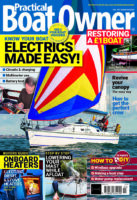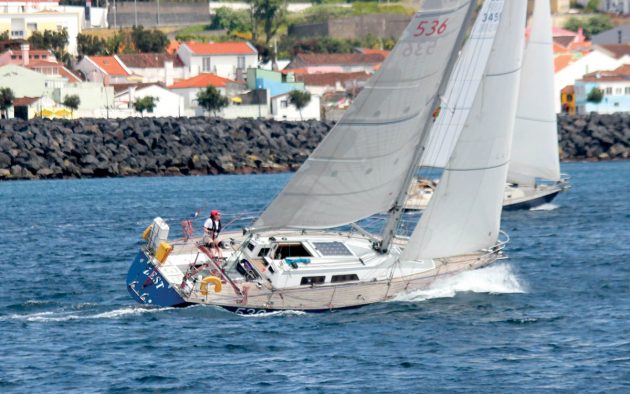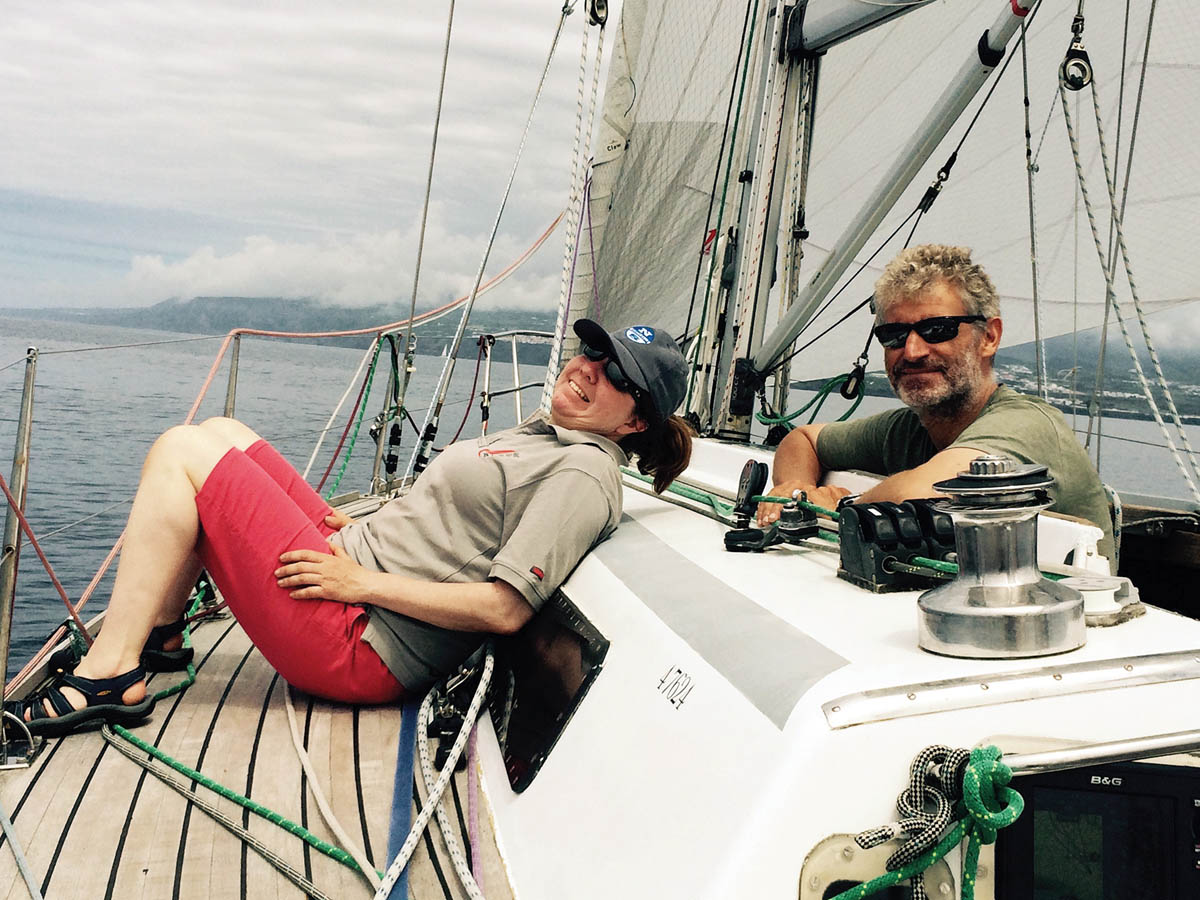Kass Schmitt recalls a frightening incident that resonates in the current pandemic crisis
What could be safer than being alone in the middle of the ocean during a pandemic? This has been a frequent response to the news that this year’s Original Singlehanded TransAtlantic Race (OSTAR) was been postponed for a year due to the COVID-19 pandemic. I think people are just trying to be funny, but as someone who once spent nine days alone at sea with a respiratory infection, I can tell you it’s no laughing matter.
In 2015, I took part in the Royal Cornwall Yacht Club’s Azores and Back Race (AZAB) on Zest, my 1992 Humphreys 36 custom racer/cruiser. This iconic quadrennial British ocean race consists of two 1,200-mile legs from Falmouth to Ponta Delgada and back, and has traditionally been open to solo and double-handed crews (fully-crewed entries will be permitted in the next edition).
I decided to race out double-handed with my partner Rupert Holmes and then return solo as a qualifier for the 2017 OSTAR.
Our outbound leg was a lively seven-day downwind romp in which we claimed line honours for our class, but disappointingly ended up third on handicap after spending much of our final day becalmed in sight of the finish while the chasing boats caught up. I was hoping to be able to hang on to our class podium position on the return, but my main aim was simply to finish safely and secure my OSTAR place. But first, it was time for ten days of rest and relaxation on the beautiful volcanic island of São Miguel.
The first few days were spent on the usual post-passage chores of laundry, cleaning, boat maintenance and repairs. Evenings were spent celebrating with the most recent finishers in the marina bar. Once most of the fleet had arrived, the organised social events began, including a drinks reception hosted by the Ocean Cruising Club, a coach tour of the island laid on by the Tourism Authority, a gala dinner courtesy of the Azorean Government, and finally the pontoon party thrown by the competitors as a thank you to our hosts and race organisers. One of the best aspects of short-handed racing is the degree to which the crews from all the boats mix, and this mixing continued late into most evenings, usually on board Ruffian and usually involving gin.
Both my blade jib and Code 0 sails had suffered a little on the first leg, so we’d sent them off to a local sailmaker to be patched up. When they returned we headed out for a day sail to test them out, inviting our friend Trevor Drew and his partner Sandrine to join us.
The cough arrived a few days before the start of the return leg. Rupert got it first, while I started to feel a bit run-down and irritable, but attributed it to too much partying, nervousness about my solo return, and a lack of good sleep due to the marina having been a bit rolly. Keen to nip a potential cold in the bud, I convinced Rupert that we should treat ourselves to a night of decent sleep in a hotel.
The morning of the leg 2 start finally arrived and I made my final trip ashore to do my last minute provisioning of fresh produce at the public market, which included a large bunch of diminutive Azorean bananas, superstition be damned! On my return to the boat I tied them to a handrail in the saloon, and boiled a pot of new potatoes while studying the latest weather forecasts, which predicted light easterlies dying away to nothing before a strong gradient would fill in from the west the next day.
I said my goodbye to Rupert, and motored out to the start area. After watching class 4 start, I made a respectable if not stellar job of it myself. I was among the first handful of boats in class 3 to cross the line, fully powered up and on the wind. I bore away around the turning mark and headed for the western end of the island.
As predicted the wind died to practically nothing, and the fleet was left ghosting along off the western tip of São Miguel. I spent much of the night flying the Code 0, trying to keep moving at all costs, recognising the conditions as an opportunity to make gains over heavier boats with more easily frustrated skippers.
Twenty-four hours into the race I was thrilled to see my hard work was paying off, as I was lying 7th overall across the 55-boat fleet.
The wind ramped up quickly and veered from south to west and I progressively shortened sail as we experienced frequent gusts into the 30s. I started to pay for my lack of sleep on the first night. I knew I should be resting, if not sleeping, frequently during the day but found I was too anxious to do so. I also found myself coughing a lot and feeling sick to my stomach, which surprised me, as I’ve never suffered from seasickness.
On the third morning I shook out the second reef and considered going to full main and my Asymmetric kite, but decided the sea state was still too lumpy.

Just after the start Kass took a selfie with a bunch of bananas – which she later threw over the side
I tried the first of my Azorean bananas and was immediately violently ill. I decided perhaps there might be something to the superstition, and chucked them overboard to be safe.
I napped for a bit and awoke to find my friend Jerry Freeman on his J/105 Juliette overtaking me with his asymmetric kite about 3 miles to the east. The sea state had moderated and I knew I should hoist a kite but I just felt too lethargic.
After a few naps, I was finally able to summon the energy to hoist a kite in the early evening but found myself being indecisive about which one to choose.
I spent much of the fourth night trying to keep moving as I crossed a wind hole under Code 0. Unlike the first night, when I knew we were all in the lull and so I was making gains by keeping going, this time I could see my competitors in the better winds to the north speeding away at 7 knots. I tried my best, but at some point I fell asleep without setting my alarm (which I normally set to go off every 30 minutes through the night) and awakened to find we had just sailed through a squall with gusts up to 18 knots.
Miraculously the pilot had been on compass mode and the sheets for both the Code 0 and the main had fouled themselves on winches in such a way that they were trimmed for the hotter wind angle, sparing the sails damage from flogging. However I was furious with myself for my failure to keep a proper watch, as I had crossed about 3 miles ahead of four of my competitors while asleep. Although this was my first long-distance solo race, I’d done a solo passage from the Azores to Falmouth two years before and not had any trouble waking for half-hourly alarms, so I just couldn’t understand why I was struggling now.
The wind gradually ramped up again on the Friday and I spent much of the day making great progress running under my big symmetric kite. In the early evening I decided to bank my gains, and replaced the kite with the poled-out jib. I love running with this sail plan, as Zest feels very stable and goes like a train. This gave me the peace of mind to get lots of sleep in that night.
In the morning, feeling much restored, I decided to do some hand steering, as the seas had built overnight, and I enjoy getting the boat to surf as much as possible.
The wind moderated on Sunday, but physically I was feeling rougher and rougher. I was convinced I had a cold, but it was unlike any I’d had before. The coughing fits were preventing me from sleeping, and at times would cause me to vomit or leave me struggling to breathe. My ribs were hurting and I lost my appetite.
Finally on the ninth morning of the race I found myself becalmed in the vicinity of Wolf Rock. So close, yet, given the forecast for no wind whatsoever, so far.
I was fed up, and felt worse than I can ever recall feeling. I would have given anything to be back at a desk in a soul-destroying office at that point, and came very close to turning on my engine and retiring.
Luckily I convinced myself to have a short nap before making the decision, and when I awoke I was overjoyed to find an unexpected sea breeze had materialised. We started to move at 6 to 7 knots under the Code 0 and it felt like a miracle. I messaged Rupert to tell him I expected to finish that evening, and begged him not to be too disappointed to see me come in under white sails, as I didn’t feel I’d have the energy for anything more.
However, as I approached the Lizard a couple of lower rated boats appeared on my AIS, five miles back but gaining. My competitive spirit was revived: somehow I found the energy not only to hoist my asymmetric kite, but to then peel to the big symmetric kite as I bore away around the Manacles Buoy.
At 19:46 on 2 July, 2015 I finished the return leg of the AZAB. The photos Rupert took of that moment from the race committee’s RIB show me sat motionless at the helm, no smiling or waving, and certainly no celebratory jumping around. The RIB dropped Rupert on board and I immediately put him to work getting the kite down and preparing the boat for arrival in port.
Once ashore, I attempted to go for a curry with a group of my solo competitors, but had to excuse myself before the mains had arrived to avoid the embarrassment of confusing the pilau for a pillow.
Post-race washup

Many of the skippers would congregate every day and long into the evening – almost certainly a source of infection for many of us!
While comparing notes with other competitors in the following days, we found a handful who were also suffering from coughing fits. I had a chat with one skipper who happened to be a physician, and he assured me that it was almost certainly just a touch of bronchitis.
I wasn’t convinced though, and spent some time Googling my symptoms.
I eventually happened across a website by a retired GP who’d made it his mission to educate people about pertussis, more commonly known as whooping cough. In particular he was keen to dispel the myth that it only affects children who have not been vaccinated.
As soon as I got home to London I visited my GP and shared my discovery. He was sceptical, as most doctors tend to be when presented with diagnoses from Dr. Google, but humoured me by ordering a test.
The following week a different GP phoned to tell me the test was positive for pertussis, and commented that he would have to congratulate my GP on his excellent diagnosis!
I continued to suffer from uncontrollable coughing fits and disturbed sleep for another four months, and it was nearly a year before I felt 100% fit again.
Lessons learned for the post-COVID sailing world
- Apart from the obvious reminder about the importance of washing hands and catching our coughs, I think I am now much more protective of my health before going to sea, especially when I am sailing solo.
- Post-COVID, I plan to significantly reduce the number of pre-race social gatherings I attend.
- Whooping cough is rarely fatal for those over five years old, but I did find it disabling. The possibility of finding yourself alone at sea with a severe case of COVID-19 doesn’t bear thinking about. Almost no vessels would be equipped or prepared to perform a rescue safely, nor would I feel it acceptable to ask them to do so.
- When I realised I was experiencing something significantly different to a common cold the proper course of action would have been to contact HM Coastguard with a request for medical advice. They’d have then put me touch with the UK’s designated Telemedical Advice Service, whose specially trained medics provide free support and advice in cases where individuals suffer an illness or injury at sea which is beyond what the ship’s crew has been trained to deal with.
- It turns out my onboard medical kit contained erythromycin, the antibiotic most frequently used to treat pertussis. I can’t be sure the medics would have correctly diagnosed pertussis, but as erythromycin is used for a number of bacterial infections with acute coughs, there’s a good chance they’d have advised me to use it. Although it wouldn’t have stopped my coughing, if a course had been started early enough it might have reduced the length and severity of my symptoms, and reduced the risk of my transmitting to others it once I reached land.
- I think the most important lesson is, try as we might to prove otherwise, it really is the case that no man is an island. Now, more than ever, our collective health depends on all of us, solo sailors included.







